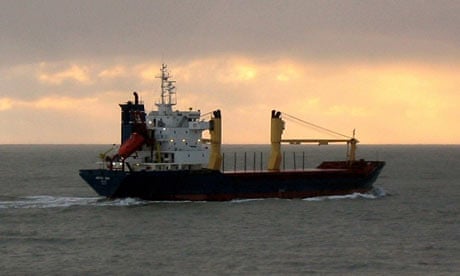Russia today categorically denied media reports that the Arctic Sea ‑ the Russian cargo ship apparently hijacked by pirates ‑ had been carrying a secret cargo of anti-aircraft weapons destined for Iran.
Its foreign minister, Sergei Lavrov, dismissed claims made in Russian and British newspapers that the ship was concealing a delivery of the S-300, Russia's most advanced anti-aircraft system. The arms had been loaded on to the ship in Russia's Baltic port of Kaliningrad, the reports said.
Lavrov called the claims an "absolute lie". He promised that Moscow would carry out its own investigation into the boat, which vanished after passing through the Channel on 28 July, apparently carrying a £1.1m cargo of Finnish timber.
"We will make it as transparent as possible so everyone can see that the rumours are false," he said.
Russia claims hijackers seized the ship in international waters off Sweden, four days before it went missing. It says its navy recovered the boat on 17 August, near the Cape Verde islands, off the west coast of Africa. It has charged eight people ‑ four Estonians, two Russians and two Latvians ‑ with hijacking and piracy.
Ever since the Arctic Sea vanished, however, doubts have been raised about the official version. Citing Israeli sources, the Sunday Times claimed at the weekend that the Israeli intelligence agency Mossad had been secretly tracking the cargo ship and had "set up" the entire "hijacking" operation to prevent the S-300s from reaching Iran.
Mossad had allegedly tipped off the Russian government that former military officers with links to the underworld had sold the anti-aircraft rockets to Tehran, the paper said. Russia then launched a search and rescue mission involving frigates and nuclear submarines to prevent the incident blowing up into an international scandal, it added.
Today Russian defence specialists cast doubt on reports of Mossad's involvement and said there was no evidence to suggest S-300s were on board the Arctic Sea. "I think this is complete bullshit," Ruslan Pukhov, director of the Moscow Centre for Analysis of Strategies and Technologies, said. He added: "I can explain why but I can't be bothered."
Other experts have speculated that the ship was carrying a secret cargo ‑ drugs, arms, or possibly even dangerous nuclear material. Some have said that this was simply a mafia deal, with no political connotations, or international dimension. Others have hinted at the involvement of Russia's Federal Security Service (FSB), the country's powerful post-KGB spy agency.
The saga grew even more baffling last week when the Russian journalist who on 8 August alerted the world to the Arctic Sea's disappearance, giving numerous interviews, and touring Russian TV stations, said he had been forced to flee Russia.
Mikhail Voitenko, editor of the online maritime bulletin Sovfracht, said he had skipped the country after receiving a threatening late-night phone call early last week. He initially fled to Istanbul, and is now believed to be in Thailand.
On Monday his employer Sovfracht posted a brief announcement on its website saying that Voitenko had been sacked. No reason was given, but this appears to be linked to Voitenko's claim that those responsible for threatening him had links with the security services.
Speaking to the Guardian last Thursday, Voitenko recalled how his late-night caller spoke in a "chilling voice" and warned him bluntly he was "stepping on the heels of some serious people". The man informed him that these "people were out for revenge", Voitenko said, adding: "I was told, these guys are out for revenge. They are very unhappy with you." Voitenko said the man urged him to leave Russia as rapidly as possible.
